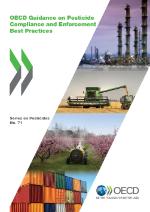ENV Pesticide Compliance › Best Practices
Best Practices
| OECD |
The OECD Pesticides Programme has issued an OECD Best Practices Guidance that addresses compliance and enforcement issues as they relate to pesticides and associated health and environmental risks.
This Best Practices Guidance addresses compliance and enforcement issues as they relate to pesticides and associated health and environmental risks.
For each of these areas, the best practice guidance:
- Reviews regulatory requirements, and lists compliance and enforcement activities that regulators can conduct to ensure compliance;
- Includes guidance on how to detect problems, check compliance and determine whether a problem of non-compliance does exist;
- Provides factors to consider when assessing the risk of non-compliance;
- Informs about risk tolerance and risk management options (including communication aspects); and
- Provides guidance on the evaluation of effectiveness of the responses given to non-compliance.
This Guidance document was developed by an ad hoc Expert Group on Pesticide Best Practices Compliance, as part of the OECD pesticide risk reduction activities and was approved by the OECD Working Group on Pesticides, a group composed primarily of representatives of the 34 OECD governments but that also includes representatives of the European Commission and other international organisations, the (bio-)pesticide industry, and the environmental & consumer community.
The OECD Series on Pesticides includes documents that are developed by the OECD Pesticides Programme, that is part of the OECD work on chemical safety. Such documents include reports from workshops and seminars but also guidance documents or survey reports.
| Australia |
The regulatory reforms will bring the Agvet Codes up to date with contemporary regulation in Australia, with practice and procedures to be developed to implement the legislative reforms.
Related Documents


